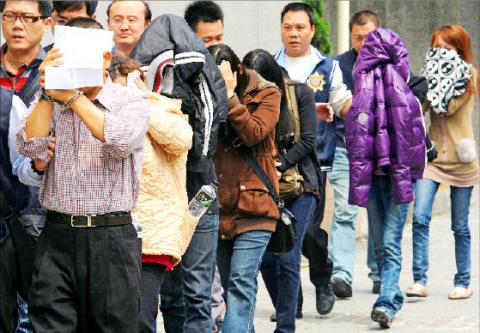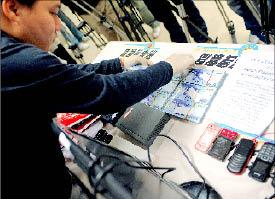Tears well up in Chen A-hsiu’s eyes as she recalls her son’s first trip abroad — to Thailand — which will also be his last until he finishes a 12-year jail term there for fraud.
Chen said her son, a 25-year-old high-school dropout, was tricked by a “friend” into going to Bangkok to unknowingly work for a fraud ring before he was arrested and imprisoned last year.
“They gave him forged ATM cards to withdraw money, and when he felt something was wrong, they threatened him to keep him doing it until he was caught,” said Chen, who is 50 and works as a janitor in Taipei.

Photo: Sam Yeh, AFP
The case is part of a trend of Taiwanese fraud rings expanding into Southeast Asia as they seek new business opportunities after being driven from China.
China was, until a few years ago, a favorite destination for Taiwanese criminals hoping to evade arrest and sometimes start new lucrative careers.
However, that changed when Taipei and Beijing signed a crime-fighting agreement in 2009, and in less than a year, more than 1,600 suspected swindlers were rounded up on both sides, according to Taiwanese police.

Photo: Sam Yeh, AFP
“Fraud rings now relocate to Southeast Asia,” said Tsai Tyan-muh (蔡田木), a criminologist at Central Police University. “The area is close by and the criminals can spread across several countries, making it less likely they’ll get caught.”
Arrests of Taiwanese and Chinese nationals have since been reported in Thailand, Vietnam and the Philippines.
In February, a decision by the Philippine government to deport a group of 24 suspects, including 14 Taiwanese, to China triggered a diplomatic row with Taipei.
“Fraud rings are becoming common because they’re operating with virtually no costs, but can bag huge profits if they succeed,” Tsai said.
“They’re good at copying [each other’s] business models, so they come back quickly after each crackdown,” he said.
Technological advances have also made it more convenient for fraudsters to operate across borders, as shown in a growing number of scams involving instant messaging, social networking and online bidding sites, police said.
“Fraud rings are going international and have more tools at their disposal. It’s getting more difficult to track down the masterminds,” said Liang Chuang-ting, an anti-fraud expert with the Criminal Investigation Bureau.
In Thailand, where more than 100 Taiwanese and Chinese suspects were detained last year, the police said they are gearing up for “major arrests soon” after collaborating with their Taiwanese and Chinese counterparts.
Kitti Sapaothong, deputy commander of the Royal Thai Police’s economic crime unit, said Taiwanese and Chinese gangs arrange their business across borders so they are harder to crack.
“Gangs based in Thailand normally target people in Taiwan or China or abroad, while those targeting Thais are based in Taiwan or China. That’s why it’s harder for us to arrest them,” he said.
Chang Hsieh-hai (張學海) has made several visits to Thailand’s crowded jails in his capacity as head of the Taiwan Association for Legal Aid, a non-governmental organization with a mission to help people in legal trouble.
He estimated that dozens of young Taiwanese are now held in Thai prisons on fraud charges.
“I believe that some were lured to Thailand by false job deals only to become pawns of the fraud rings and were slapped with heavy prison terms of up to 20 years,” Chang said.
Fraud rings usually pick young people who have never gone abroad, speak no English and are from humble backgrounds like Chen’s son so they are more easily manipulated, he said.
The Ministry of Foreign Affairs, on the other hand, has said many young people arrested in Thailand were aware of the nature of their “job,” but fell for the fat salaries and luxury houses promised by fraud rings.
Chen, however, insisted that her son fell victim to a scam.
“He is a simple young man looking for a job, but now he will forever have a criminal record. I dare not think how he is going to spend 12 years in a jail abroad,” said Chen, who is appealing her son’s case.

Chinese spouse and influencer Guan Guan’s (關關) residency permit has been revoked for repeatedly posting pro-China videos that threaten national security, the National Immigration Agency confirmed today. Guan Guan has said many controversial statements in her videos posted to Douyin (抖音), including “the red flag will soon be painted all over Taiwan” and “Taiwan is an inseparable part of China,” and expressing hope for expedited reunification. The agency last year received multiple reports alleging that Guan Guan had advocated for armed reunification. After verifying the reports, the agency last month issued a notice requiring her to appear and explain her actions. Guan

GIVE AND TAKE: Blood demand continues to rise each year, while fewer young donors are available due to the nation’s falling birthrate, a doctor said Blood donors can redeem points earned from donations to obtain limited edition Formosan black bear travel mugs, the Kaohsiung Blood Center said yesterday, as it announced a goal of stocking 20,000 units of blood prior to the Lunar New Year. The last month of the lunar year is National Blood Donation Month, when local centers seek to stockpile blood for use during the Lunar New Year holiday. The blood demand in southern Taiwan — including Tainan and Kaohsiung, as well as Chiayi, Pingtung, Penghu and Taitung counties — is about 2,000 units per day, the center said. The donation campaign aims to boost

The Kaohsiung Tourism Bureau audited six hotels in an effort to prevent price gouging ahead of Korean band BTS’ concert tour in the city scheduled for Nov. 19, 21 and 22 this year. The bureau on Friday said that the audits — conducted in response to allegations of unfair pricing posted on social media — found no wrongdoing. These establishments included the local branches of Chateau de Chine, Hotel Nikko, My Humble House, and Grand Hai Lai, it said, adding that the Consumer Protection Commission would have penalized price gougers had the accusations been substantiated. The bureau said the Tourism Development Act

The Central Weather Administration (CWA) said a magnitude 4.9 earthquake that struck off the coast of eastern Taiwan yesterday was an independent event and part of a stress-adjustment process. The earthquake occurred at 4:47pm, with its epicenter at sea about 45.4km south of Yilan County Hall at a depth of 5.9km, the CWA said. The quake's intensity, which gauges the actual effects of a temblor, was highest in several townships in Yilan and neighboring Hualien County, where it measured 4 on Taiwan's seven-tier intensity scale, the CWA said. Lin Po-yu (林柏佑), a division chief at the CWA's Seismological Center, told a news conference